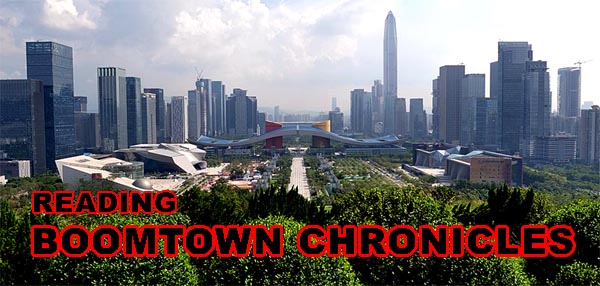 |
| Shenzhen, the Boomtown (Wikipedia) |
Note: Between Lesson #01-128 and #01-208, I wrote 72 lessons explaining expressions in articles published in the Shenzhen Daily. Read more about "Reading Boomtown Chronicles."
Get Ready: Have you ever crossed a land border between countries? Or have you landed in a seaport or an airport in a foreign land? What did you have to do in any of these cases?
Boomtown Chronicles Part XX - published Monday, November 10, 2008
- The article contains a group of words centering around "border."
border: originally "edge" or "side," it now indicates the line between one province, state, country, etc. and another. Its original form was "bord," which comes through Old French from a Germanic root. The "side" meaning still turns up in words like "starboard," the right side of a ship as one faces forward. Also, to "board" a ship was to cross over its side. And we have an idiom, "by the board," meaning something like "off to the side," and thus "neglected": "He wanted to be a rock singer, but that plan went by the board after he got married."
Note that this is unrelated to the meaning of the word "board" meaning a flat piece of wood.
"Border" was originally used in reference to pieces of cloth or paper being joined at their edges; the use as a place where two areas of land meet dates back only to the 16th century.
- At the "crossing" we encounter a "checkpoint."
crossing: a place and goods where people cross. This is a verb turned into a noun.
checkpoint: a place ("point") where documents are verified ("checked").
- Two kinds of "ports" between the Mainland to Hong Kong are mentioned in the article: land ports and seaports.
port: originally, door. A seaport was the "door" through which ships brought passengers and goods into a country. "Port of entry" applies to all kinds: land, sea, and air "ports."
- Some of the land ports can accommodate "vehicles."
vehicle: usually a car, truck, bus, bicycle, or other form of transportation. But we also use it in many figurative ways. For example, a film that advances an actor's career is called a "star vehicle." A good education can be a "vehicle" for success. We can also use it to describe various media: air is a vehicle of sound, and the Shenzhen Daily is a vehicle for news.
Interestingly, such "secondary" meanings were in fact the first ones. The use of "vehicle" to describe a "cart or other conveyance" dates back only to the mid-16th century.
--------
Read more: https://en.wikipedia.org/wiki/Shenzhen
Practice: Choose the correct term to fill in the blank in the sentence below:
- board
- border
- by the board
- checkpoint
- crossing
- seaport
- starboard
- vehicle
- They told us we had to ________ the airplane immediately.
- The border passes near my house, but there's a ________ just a mile away where I can get to the other side.
- In most states you'll need a license to drive a ________.
- The boat landed at the ________ where it unloaded its cargo.
- He presented his papers to a border guard at the ________.
- She wanted to be a rock star, but that plan went ________ after she got married.
- The government set up watchtowers all along the ________.
- You paddle on the port side of the boat and I'll paddle on the ________.
Answers are in the first comment below.
Submitted to the Shenzhen Daily for November 17, 2008


Answers to the Practice: 1. a; 2. g; 3. f; 4. e; 5. b; 6. d; 7. h; 8. c
ReplyDelete